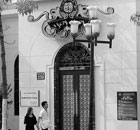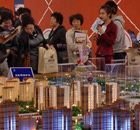Top Biz News
Backgrounder: China's CPI since 1978
(Xinhua)
Updated: 2010-02-27 17:51
 |
Large Medium Small |
BEIJING: Chinese Premier Wen Jiabao pledged to prevent possible inflation during an online chat with Netizens held on Saturday. Following are some basic facts about China's price trend over the past years:
China's inflation has continued to rise since November last year. Its CPI rose 1.5 percent year-on-year in January, mainly boosted by food price increases due to the cold winter weather, according to the National Bureau of Statistics (NBS). The CPI rose 1.9 percent year on year in December last year.
In November 2009, the CPI was back to growth from a nine-month drop, rising 0.6 percent year on year. It had been falling since February when CPI was down 1.6 percent due to the global crisis, the first monthly fall since December 2002.
The CPI had been rising since 2003 until 2009 when the readings fell for nine consecutive months because of the global financial crisis.
The CPI fell 0.7 percent for the full year of 2009, according to the NBS.
The monthly CPI readings in 2009 were 1.0 percent rise in January, 1.6 percent drop in February, 1.2 percent drop in March, 1.5 percent decline in April, 1.4 percent decline in May, 1.7 percent decline in June, 1.8 percent decline in July, 1.2 percent decline in August, 0.8 percent decline in September, 0.5 percent decline in October, 0.6 percent rise in November, and 1.9 percent increase in December.
In the seven years between 2002 and 2008, China's CPI readings were 0.8 percent drop in 2002, 1.2 percent rise in 2003, 3.9 percent rise in 2004, 1.8 percent rise in 2005, 1.5 percent rise in 2006, 4.8 percent rise in 2007 and 5.9 percent rise in 2008, respectively.
The 5.9 percent rise in 2008 was the peak since 1999 when the CPI dropped 1.4 percent, the lowest inflation rate since the country's reform and opening-up in 1978.
| ||||
The first cycle started from 1982 and ended in 1990. The CPI posted a 2 percent rise in 1982 and then fluctuated up until an 18.8 percent rise in 1988 before it slumped to 3.1 percent rise in 1990.
The second cycle ended in 1999. Starting from 1990, the CPI climbed steady and fast to 24.1 percent rise in 1994, the record high, until it slipped continuously to 1.4 percent drop in 1999.
The third cycle ranged from 1999 till 2009. During this period, the CPI figures fluctuated slightly until it reached a 5.9 percent rise in 2008. Then the CPI fell 0.7 percent for the full year in 2009.
In the years between 1978 and 1982, China's CPI readings were 0.7 percent drop in 1978, 5.8 percent rise in 1979, 6 percent rise in 1980, and 2.4 percent rise in 1982.
Home purchase costs were excluded from the country's CPI calculation and food still accounted for the biggest proportion.
Since people's eating and consumption habits have changed greatly in recent years, experts held that the criteria for evaluating CPI needed modification in line with actual conditions to give a clearer and real-time picture of the general living costs and financial pressure citizens.
Housing costs also occupy an increasingly bigger share of incomes, so corresponding modifications seem to be necessary, as policy-makers will read CPI and other metrics for judging economic performance.
The NBS raised the weight of rent, water, electricity and maintenance costs in the CPI basket from 9.7 percent in 2000 to 13.2 percent in 2006 as the rents rose. The weight now is around 13.6 percent.
China's CPI basket includes other types of commodities: food; alcohol and cigarettes; clothing; home appliances and maintenance; medical care; transport and communication; education and entertainment.













